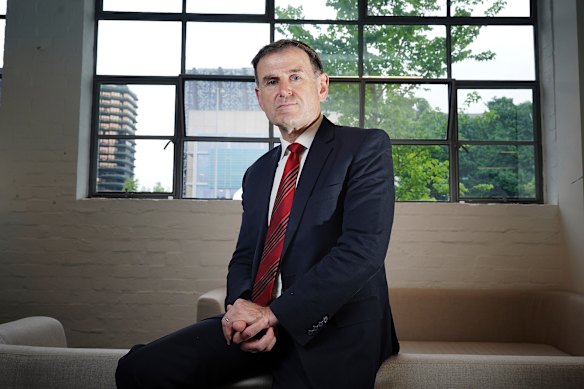Loading
“This approach punishes some of our most productive companies and industries which touch our lives every day and employ millions of Australians.”
Council of Small Business Organisations Australia chairman Matthew Addison said the proposals could boost confidence and investment across the small business sector.
But he expressed concern about unincorporated businesses that sit outside the company tax system.
“We cannot afford to leave unincorporated small businesses behind in tax reform; they make up the
majority of the sector and are critical to our communities,” he said.
The Australian Chamber of Commerce and Industry said that as the cashflow tax was untried, there was a risk it could increase complexity across the tax system.
The managing director of Wesfarmers, Rob Scott, said large businesses, which would pay more under the commission’s proposals, were in the best position to boost Australia’s lagging productivity.
“If many ASX-listed companies are subject to higher corporate taxes, this will be felt by all Australians through their superannuation funds,” he said. “It could lead to a perverse outcome of encouraging Australian companies and superannuation funds to prioritise investing offshore.”

Economist Stephen Anthony says a cashflow tax would sharply increase investment by businesses.Credit: Luis Enrique Ascui
But Stephen Anthony, a former Treasury official and current head of research for Macroeconomics Advisory, said the proposal could be a game changer for the Australian economy.
Loading
He said this would reward and encourage start-ups, entrepreneurs and those wanting to make their operations more efficient.
“[Productivity Commission chair] Danielle Wood talks about productivity improvements being measured in inches. This type of reform is more about miles,” he said.
Anthony said that while the immediate impact of the tax change was neutral on the budget, longer term it would lift revenue for the federal government as businesses expanded and became more efficient.
He likened the scope of the change to the reforms put in place by former Labor treasurer Paul Keating in the 1980s.
“This is a great litmus test for the treasurer. This is the difference between words and deeds. This is the Keating test,” he said.
Shadow treasurer Ted O’Brien, who will attend the roundtable, said Chalmers had called for any measures to be either budget-neutral or budget-positive.
“That is, the treasurer is looking for ideas to raise taxes to pay for his spending spree,” he said.
“I reject that approach. Instead, I will be assessing proposals at the roundtable on the basis that they be at most ‘budget neutral’.”
Tax reform is slated to take up much of the third day of the roundtable, which will run between August 19 and 21.
The paper on company tax was the first of five that will be released by the commission before the roundtable.
The superannuation sector said better connecting it and its $4 trillion in assets with innovators could boost investment returns.
Loading
Super Members Council chief executive Misha Schubert said there had to be better linkages between funds, scientists, start-ups and entrepreneurs.
The council said a simplification of super fund performance testing and fee disclosures, targeting superannuation tax concessions towards low-income workers, and a Productivity Commission review of regulatory compliance costs should be on the roundtable’s agenda.
